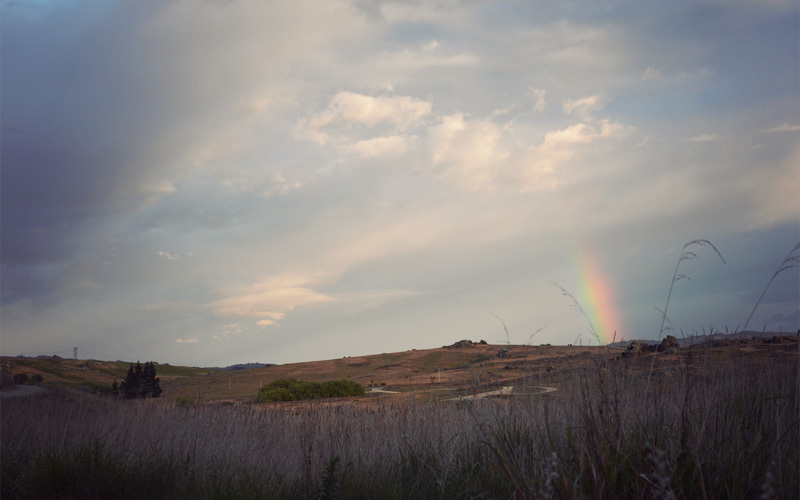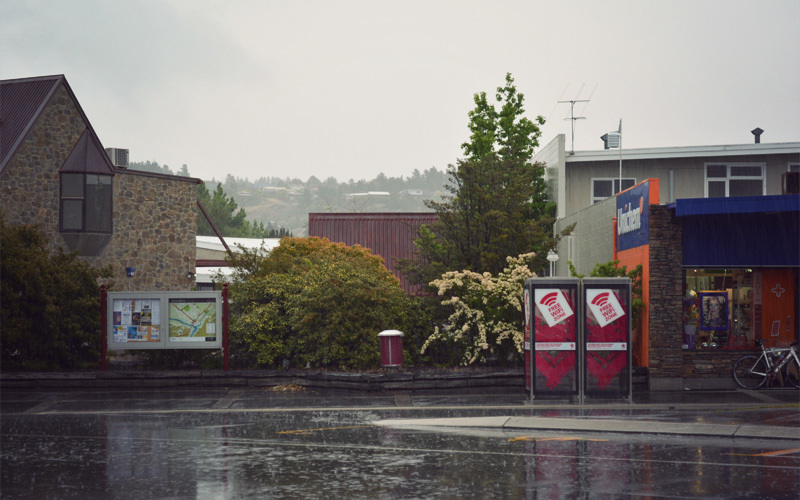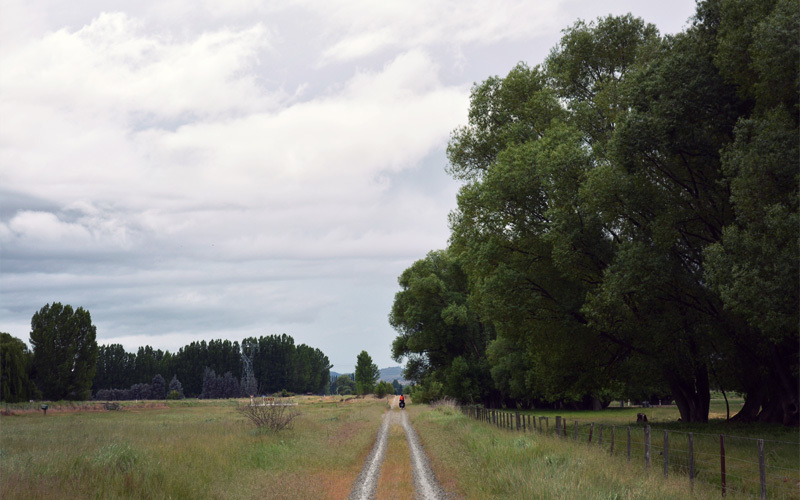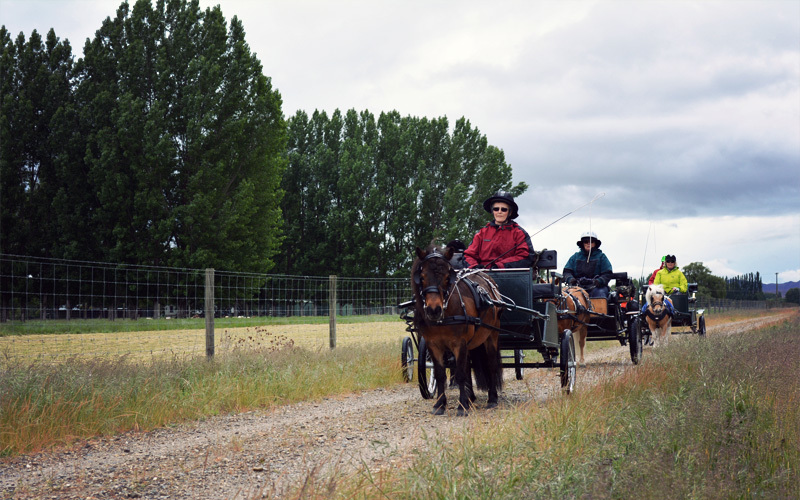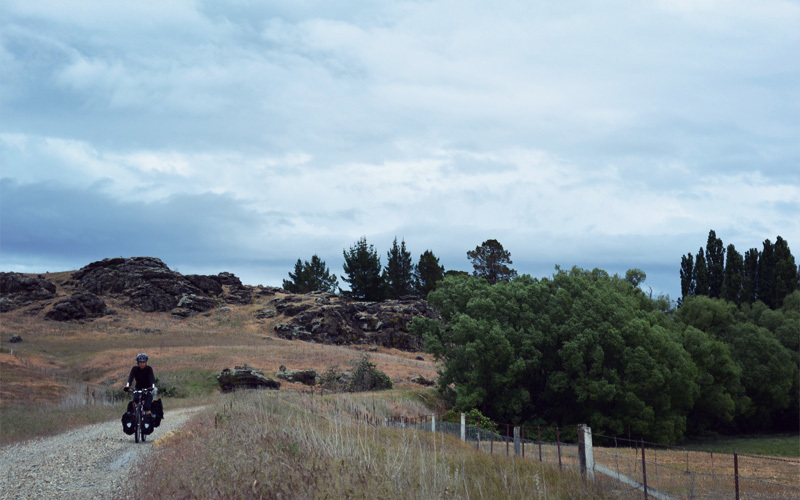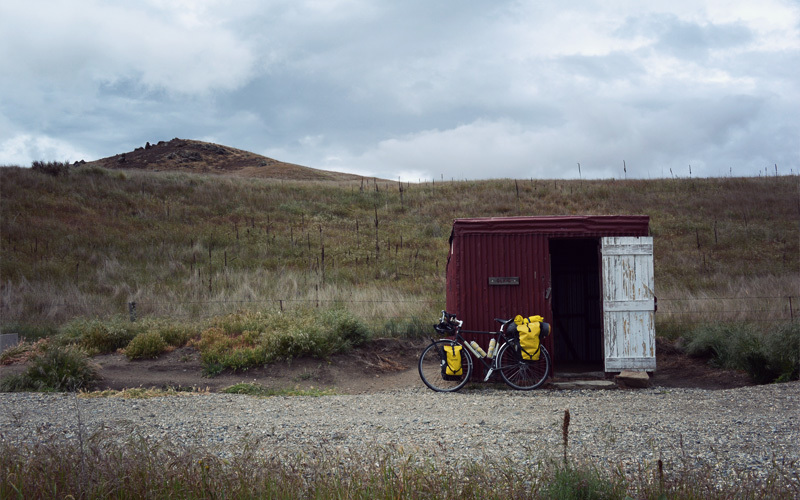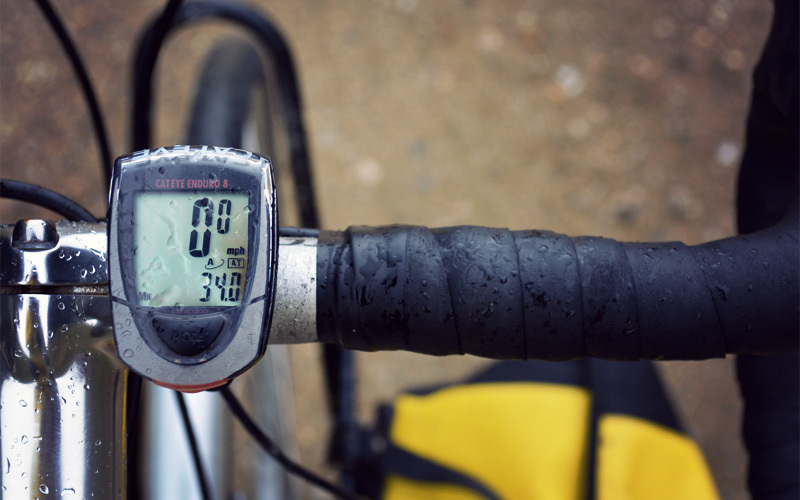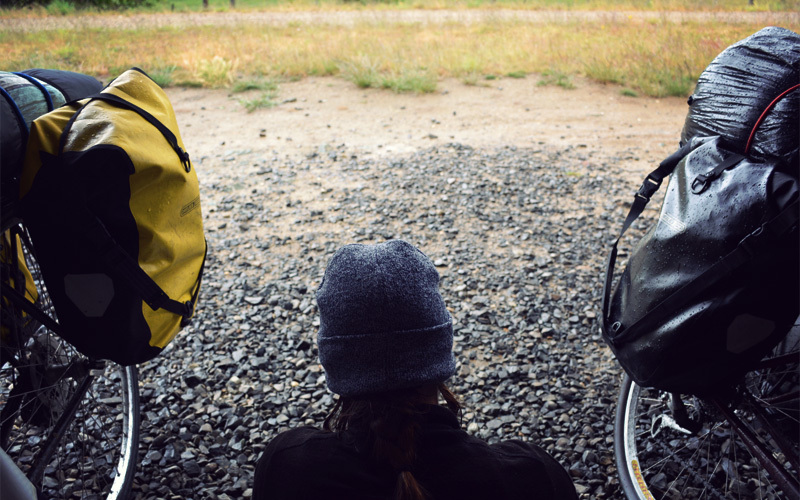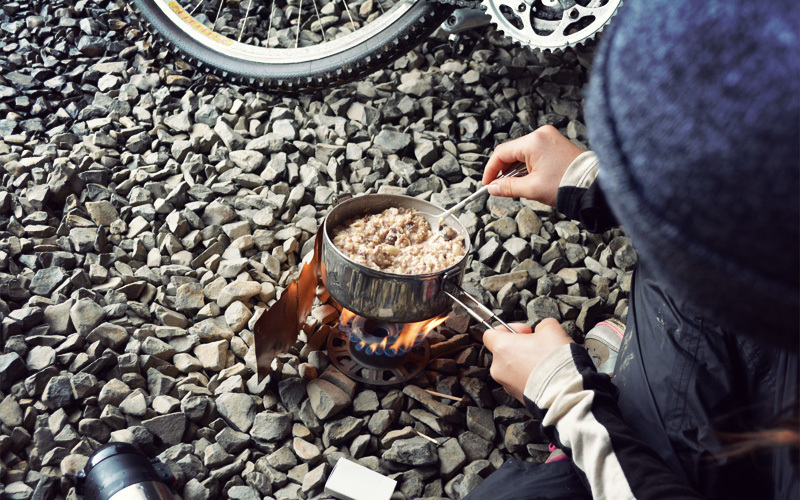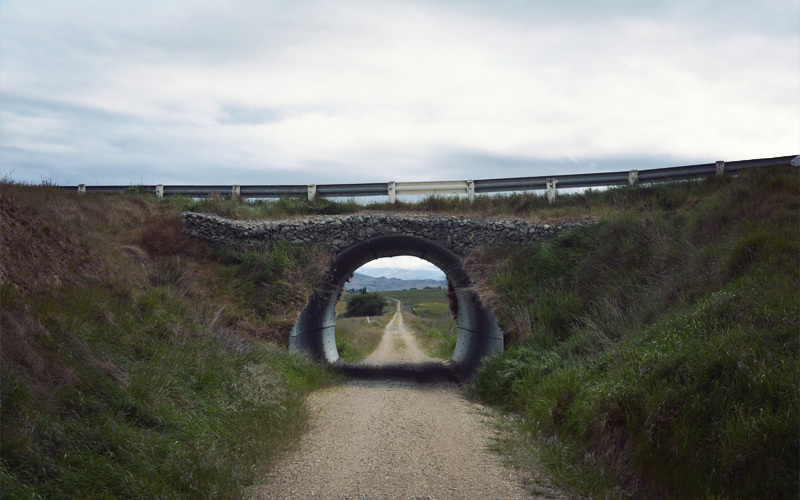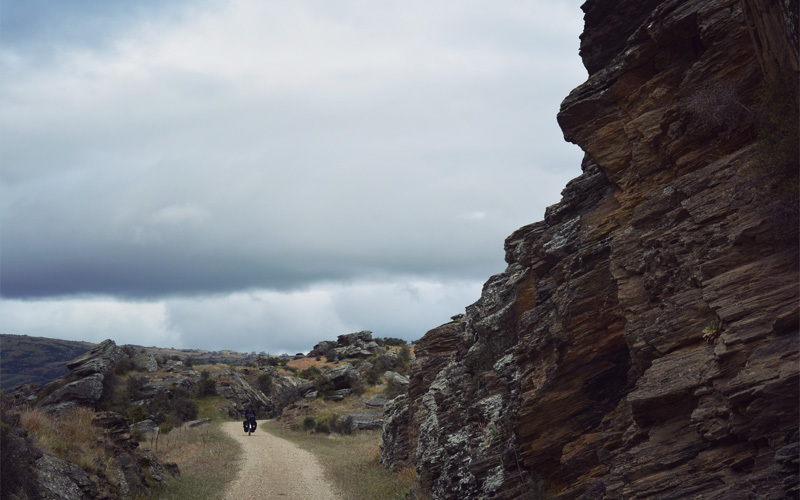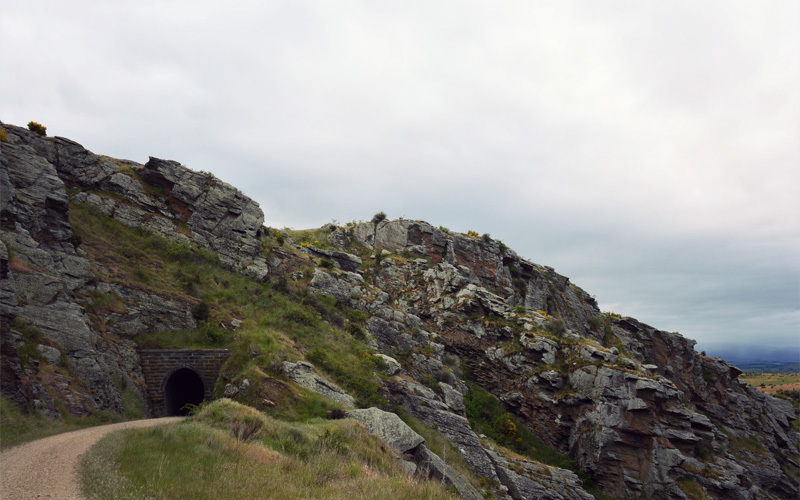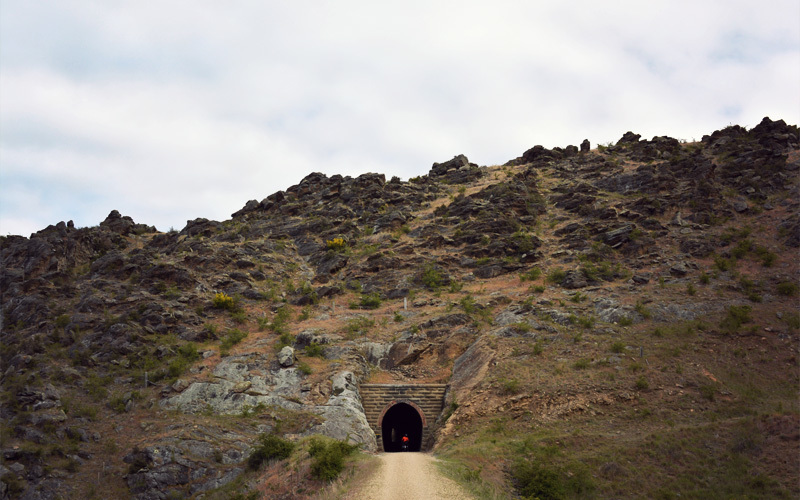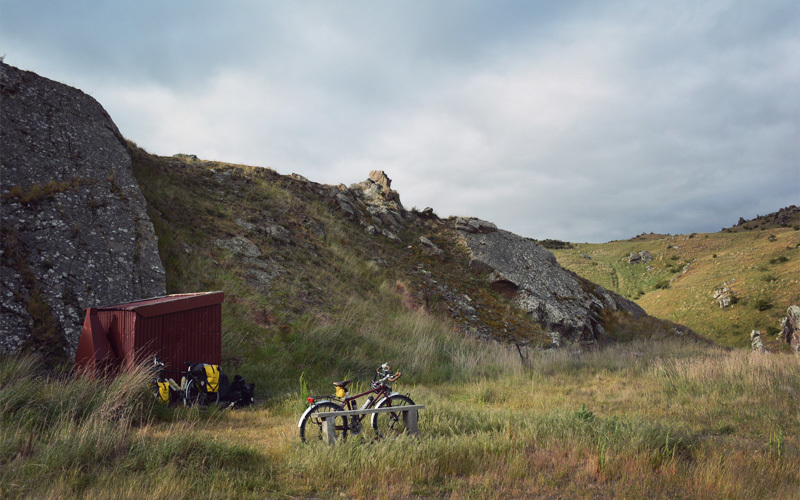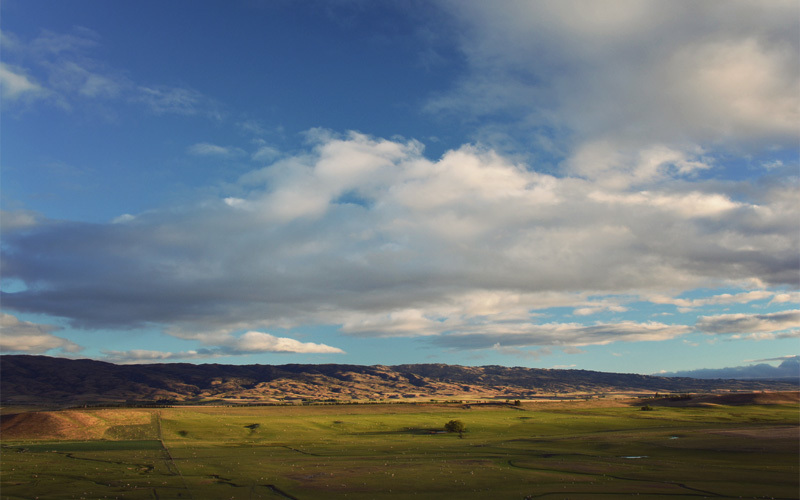November 22, 2014
Day 88: Flat Top Hill Conservation Area to near Ida Valley, NZ
As we get ready to pack up and start the day early, a cloud slightly more gray than all the rest parks itself over the tent and lets go of the rain it's been holding inside. Because there's no wind that we can notice, that's where it stays. It rains enough that we don't feel like crawling outside and heading back to the road, but not so much that we can't lay back with the flaps of the rain fly open, let the smell of the early morning pour in, and lose ourselves for an hour in the rhythm of the drops as they peck and pop on the thin layer of yellow above our heads.

| Heart | 1 | Comment | 0 | Link |
By the time we step out of the grocery store in Alexandra a few miles down the road, the light rain has given way to downpour. Of course it has. Even though we're in an area of New Zealand that's in a rain shadow, where they only get a fraction of what falls on the West Coast and in the Southland, and where it is in fact the driest and hottest possible place we could have ended up on the South Island at this time of year, still it rains and the temperature has dropped almost ten degrees since yesterday evening. Within moments, all of the cars have on their headlights, the gutters turn into a rush of water and bits of garbage, the flags point straight out, and everyone we talk to has some kind of joke about our bad timing. The year where the winter chose not to leave this half of the country continues, so we dive into a strange little cafe, set ourselves up with tea and hot chocolate, listen to farmers talk about land prices and who has the best quality hay this year, and wait for the break to come.
One of those farmers also says to another, "Rain at seven, dry by eleven." That's not a forecast; it's just what old men around here say, and probably what old men around here have said for a century and a half. And they're mostly right. Rain still falls as the clock turns over to eleven, but it's light enough that we head to the end of town and start riding toward the northeast on the Otago Central Rail Trail. Because it hardly rains here, there's nothing in the trail's design that accounts for the water on the odd day that it shows up, so we ride slow through thin mud and shallow puddles for the next couple of hours. The mud sprays up onto our legs and our chains, which causes both to pick up the little bits of dirt and rock thrown into the air by the tires as we pedal. Whenever we grab the brake levers to slow down we hear the grit actively eating away at the surface of our rims.
But it seems wrong to complain about the rain, because we're in a place where every fraction of an inch matters. Trees grow thick along the banks of the nearby river, but beyond that narrow trace of green the hills of schist and basalt stand guard over plains that glow equal parts green and yellow, even though the wettest part of the year is still upon us. Fences line the trail but we see few stock in the paddocks beyond them because there's so little natural grass beyond the sparse patches that exist in between the rocks.
When we see a dozen cows huddled in the corner of a field farther on, we know the shit is coming. And not even five minutes later it shows up, with streams of rain and then hail blowing sideways across the sky. The warm of the morning disappears and in moments our fingers start to turn colder and whiter from the sudden chill. Our jackets do what they can to keep out the wet, but at a certain point there's only so much that engineering can achieve. I know there's shelter in an old railroad ganger's shed that sits a few dozen feet off the trail only a mile or two farther on, but by the time we're able to get there we're soaked. So goes the great lesson we've learned about New Zealand: it doesn't matter where we go on the South Island, the cold and the wet and the wind will somehow find us.
We sit huddled in the shed, where the air around us has turned cold enough that we can see our breath. Rain lashes the metal siding and roof, thunder rumbles down the valley, and all we can see in any direction when we peek outside is featureless gray murk without end. We pass the time by making and eating oatmeal, giving voice to the creepy looking pure black spiders that crawl up the walls and studs behind us, doing something that resembles traditional Russian folk dancing to try and keep warm, and shivering more or less nonstop despite the effort. After three hours of this, it no longer feels selfish to complain about the rain.
When at last we leave our shelter behind and continue down the trail, an air of defeat hangs over me. We traveled to the driest, warmest part of New Zealand that we could find, and still we ride dressed in rain jackets, rain pants, gloves, and with thick hats crammed between our heads and our helmets. After a one-day reprieve it again feels more like we're at the helm of a ship at sea rather than cycling during the last part of spring. It isn't that we aren't still having fun out here — the hours we spent bunkered against the weather in the hut were filled as much laughter and joy as the disgust we felt toward what was going on outside — but the conditions are wearing us down.
It takes a lot of mental energy to steel yourself against the winter-like weather when its duration extends from days into weeks. Every mile becomes a battle, and the end of every day feels like a victory. It's tough and it's draining, and yet somehow we managed that. What's harder to deal with is the fact that we thought we'd left it all behind within a few hours of stepping off the bus two days ago. Something about that short run to the east felt cathartic and cleansing and fortifying. To learn that we have to put ourselves back on the offensive has a way of making the burden seem ten times greater.
But we keep going, and as so often happens, that makes all the difference. We start to ride above the curves of a gorge, with outcroppings of schist running up against both sides of the trail, out of the corners of which hares with bright white tails dart at high speed. Soon we switch our lights on to their brightest settings and head through a pair of tunnels where the marks of the pickaxes used to do the finer carving that the dynamite blasts couldn't appear in the schist, and where brickwork more than a century old arches above our heads.
We see our first non-dead hedgehog as he waddles from one side of the trail to the other. Around the bend beyond we cross over the gorge on a wood-decked trestle made from an elaborate metal framework, where the supports were constructed with stone mined from the surrounding hills. When we look behind us we see wide patches of blue sky for the first time since yesterday.
Then we come across a clearing with a small red metal ganger's shed that becomes our kitchen, our dining room, and our living room for the night. It is rustic and dirty and has the permanent musty smell that all really old things are required to have, but the tired sheet metal siding and roof do a better job of protecting us from the cold and wind than the modern replica we sheltered in during the afternoon ever could. With the entrance smartly placed in the exact opposite direction of the prevailing winds, we sit inside smiling and content and semi-warm, which is a big deal considering that the wind outside blows furious and frigid with no sign that an end is coming. When I spent a night in a fire station back in Utica, Kentucky three years ago, I wrote that five-year-old Jeff would have been so excited to have done such a thing. I think that kid would feel the same way about hanging out in this abandoned place, on this little-used former railroad line, out in what feels like the middle of nowhere, where the only sounds are the wind passing through the grass and the uncoordinated bleating of hundreds of sheep in the valley far below.
All of these great things happen within the same three-mile stretch. What for so long felt like a day of frustration almost in an instant became interesting and rewarding and memorable. Inasmuch as bicycle touring can hope to inform broader areas of one's life, I think today showed it: when the shit goes bad, don't give up, keep pushing, and keep looking at what's coming your way, because something wonderful that you never could have conceived of might just be waiting for you around the next corner.
Today's ride: 33 miles (53 km)
Total: 2,942 miles (4,735 km)
| Rate this entry's writing | Heart | 2 |
| Comment on this entry | Comment | 0 |
